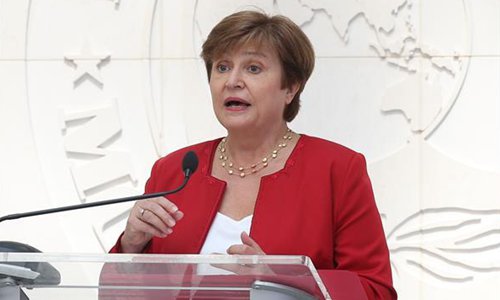HOME >> WORLD
Over 20 countries seek financial relief amid outbreaks: IMF
Source:Reuters Published: 2020/3/17 18:43:41

Kristalina Georgieva attends a press conference at the International Monetary Fund (IMF) headquarters in Washington D.C., the United States, on Sept. 25, 2019. (Photo: Xinhua)
IMF Managing Director Kristalina Georgieva on Monday said that over 20 additional countries have asked about receiving aid from the global lender as the coronavirus pandemic halts economic activity, and she called for strong, coordinated fiscal stimulus to limit the damage.
In a blog post on the International Monetary Fund's website, Georgieva said the IMF was ready to mobilize its full $1 trillion lending capacity to help member countries deal with the crisis.
"As the virus spreads, the case for a coordinated and synchronized global fiscal stimulus is becoming stronger by the hour," Georgieva said.
Some of the countries expressing an interest in IMF financing to deal with the crisis already have IMF loan programs, while others do not, an IMF spokesperson said, adding that these inquiries do not necessarily constitute formal requests.
The spokesperson declined to identify any of the countries involved, but said the most logical option for many of them would be several emergency financing facilities under which Georgieva said $50 billion would be rapidly available to ease any economic blows from the coronavirus outbreak.
Iran, hit hard by the outbreak, last week said it was seeking a $5 billion emergency loan from the IMF.
The fund currently has loan and financial backstop programs with about 40 countries valued at about $200 billion.
The IMF chief issued her message shortly before a call with leaders of the G7 wealthy democracies, several of which are battling severe coronavirus outbreaks. The leaders pledged to "do whatever is necessary"
to battle the pandemic and protect public health, jobs and growth.
Georgieva, in her blog, suggested that coordinated fiscal action on the scale of the 2008-2009 financial crisis may be necessary.
In 2009 alone, she said, the G20 deployed about 2 percent of their gross domestic product in stimulus, or about $900 billion in today's money, "so there is a lot more work to do."
Posted in: CROSS-BORDERS